When you grind sun-dried herbs by hand, you'll preserve more of their essential oils and natural compounds compared to machine processing. Hand grinding with tools like mortars and pestles or manual herb grinders gives you precise control over the texture while preventing heat damage that can diminish potency. You'll notice better flavor retention and stronger therapeutic properties since gentle manual techniques protect the delicate trichomes and aromatic elements. Plus, you can adjust the consistency based on your specific needs, from coarse to ultra-fine powder. Exploring different manual grinding methods can reveal your herbs' full potential.
Traditional Grinding Methods and Benefits
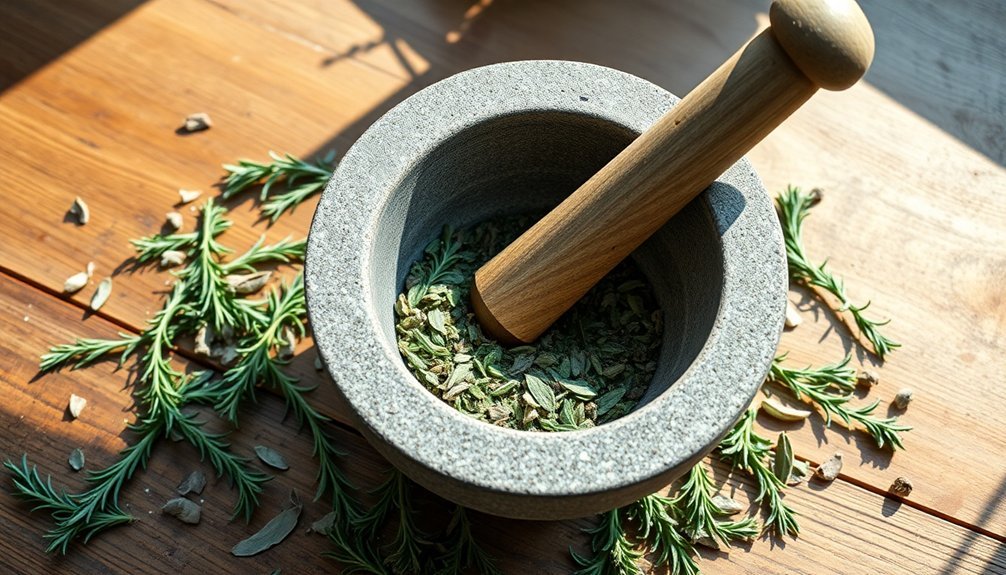
When it comes to grinding sun-dried herbs, traditional methods offer unparalleled control and versatility. You'll find that tools like the mortar and pestle excel at preserving delicate flavors while giving you precise control over the consistency of your grind.
For smaller quantities, a knife and cutting board work perfectly, while an herb grinder proves efficient for larger batches.
You can adjust your grinding technique based on the herb's texture. Use gentle motions for tender leaves to maintain their color and essential oils, but apply more force for woody herbs like rosemary or thyme.
Hand grinding helps you avoid the heat damage that electric processors can cause, keeping the herbs' natural aromas intact. Whether you need a fine powder or coarse texture, traditional grinding methods let you customize the result to suit your culinary needs. Once ground, your herbs can maintain their flavorful essence for up to a year when stored properly in airtight containers.
Preserving Essential Oils Through Grinding
Beyond traditional grinding techniques, understanding how to protect volatile oils during the process can dramatically enhance your herbs' potency.
You'll want to grind your herbs just before use, as this guarantees maximum flavor retention and prevents the loss of essential oils through evaporation. Dehydrating herbs at 95 degrees Fahrenheit provides optimal oil preservation for grinding.
Store your herbs whole until you're ready to use them, as grinding releases oils that can quickly dissipate.
- Keep your grinding tools clean to prevent unwanted flavor transfer between different herbs.
- Consider preserving herbs in olive oil or freezing them in ice cube trays for longer-term storage.
- Protect your dried herbs from light exposure by using airtight, opaque containers.
If you've sun-dried your herbs, you'll need to be extra careful, as this method can lead to significant oil loss.
Instead, opt for air-drying in a warm, dry space away from direct sunlight.
Hand Grinding Versus Machine Processing
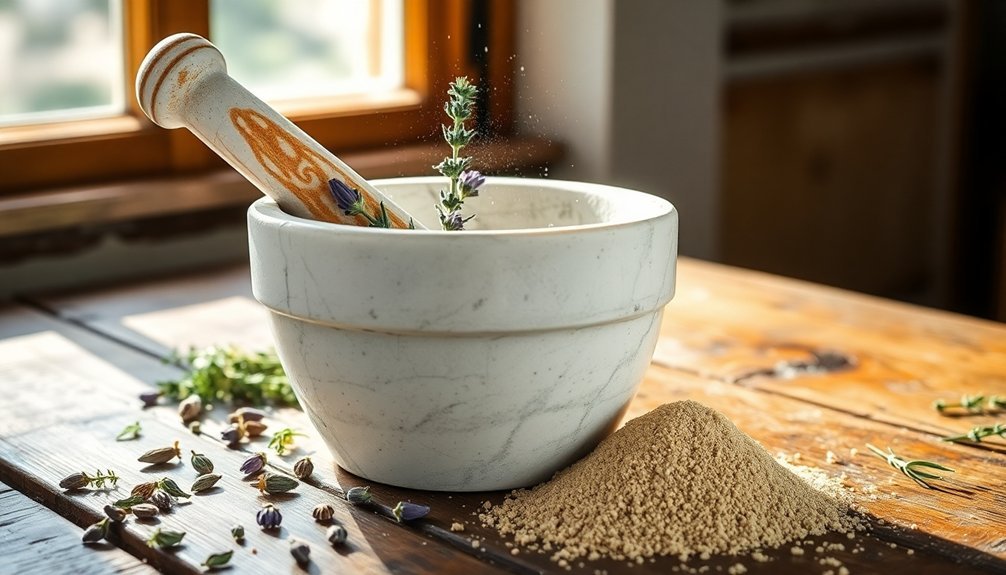
Choosing between hand grinding and machine processing can greatly impact your herb preparation results.
While hand grinding preserves more trichomes and natural oils, it's a slower process that produces uneven textures. The proper application of compression and shearing forces during manual grinding ensures optimal cannabinoid extraction. You'll get better control over the consistency, but you'll need to invest more time and effort.
Machine processing offers speed and uniformity, making it ideal for rolling joints or packing bowls. You'll get consistent results and even burning, plus it's easier on your hands.
However, you might lose some essential oils and trichomes in the process. The grinder's kief catcher helps collect fine particles, but you'll need to maintain the equipment regularly.
Consider your priorities: If you value preservation of potency and don't mind the extra effort, hand grinding's your best choice.
For convenience and consistency, machine processing won't let you down.
Selecting Your Manual Grinding Tools
Having decided on hand grinding, your next step is selecting the right tools for the job.
You'll find several effective options available, each with its own advantages for processing sun-dried herbs. Storing your freshly ground herbs in airtight glass containers will help maintain their potency and flavor for longer periods.
A manual herb grinder offers one-handed operation and produces consistently fine powder, making it an excellent choice for everyday use.
The traditional mortar and pestle provides versatility and superior flavor retention while giving you complete control over the grinding process.
A rasp grater delivers precision for small quantities and lets you achieve an ultra-fine texture when needed.
Common kitchen tools like rolling pins and meat tenderizers can serve as backup options, though they'll require more effort.
Choose based on your specific needs, considering factors like quantity, desired texture, and how frequently you'll be grinding herbs.
Proper Storage After Hand Grinding
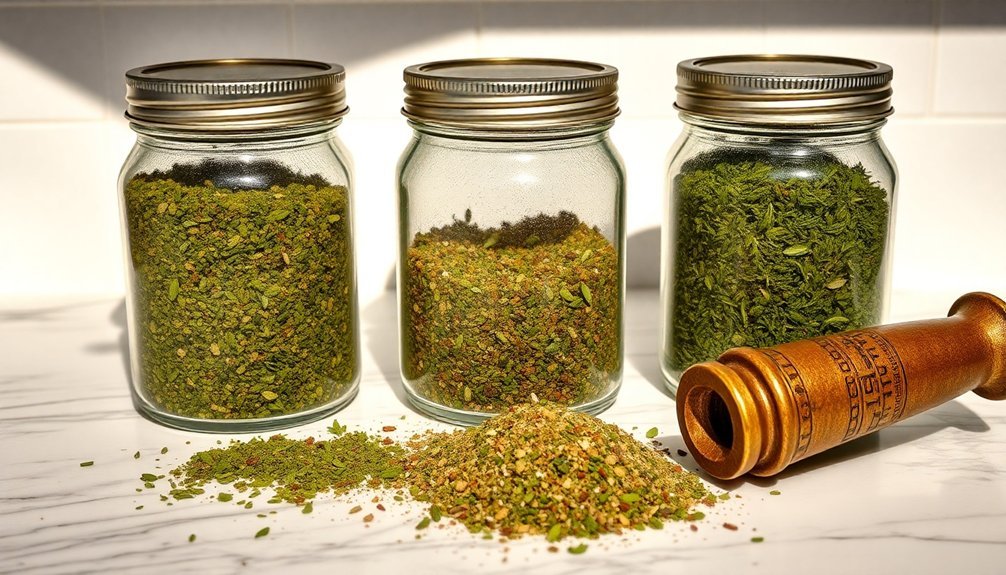
The three critical elements of proper herb storage are containers, location, and monitoring.
You'll want to store your hand-ground herbs in dark glass jars or tins with airtight seals to protect them from light and air exposure. Avoid cardboard or paper containers since they'll absorb the herbs' essential oils.
Keep your stored herbs in a cool, dry pantry or cupboard away from heat sources and humidity. A root cellar is ideal if you have one.
Don't place them near stoves or in bathrooms where moisture can degrade their quality. Once stored, check your herbs regularly for signs of mold and guarantee proper air circulation.
While whole herbs last longer, your ground herbs will stay fresh if you use vacuum-sealed containers and maintain consistent storage conditions.
Frequently Asked Questions
How Long Can Sun-Dried Herbs Remain Potent After Hand Grinding?
You'll find that hand-ground sun-dried herbs stay potent for up to a year when stored in airtight containers away from light and heat. For best results, only grind what you'll use immediately.
Can Different Herbs Be Ground Together Using the Same Tools?
You can grind different herbs using the same tools, but it's best to clean them thoroughly between uses. Strong volatile oils can transfer flavors, so you'll want to prevent cross-contamination to maintain distinct herb characteristics.
What Time of Day Is Best for Grinding Sun-Dried Herbs?
You'll get the best results grinding sun-dried herbs in the morning when humidity is low. The dry air helps prevent clumping and guarantees a consistent grind for your herbs' ideal potency.
Should Herbs Be Ground Immediately After Sun-Drying or Wait?
You should wait until your sun-dried herbs have completely cooled before grinding. This prevents moisture buildup and protects delicate compounds. Once they're at room temperature, you can grind them for ideal preservation.
How Can You Tell if Hand-Ground Herbs Have Gone Stale?
You'll notice stale ground herbs through reduced aroma, dull or faded colors, and loss of their distinctive flavor. They might also become brittle, develop a musty smell, or show inconsistent texture when you handle them.
In Summary
You'll preserve more of your herbs' essential oils and natural qualities by grinding them manually rather than using electric grinders. Hand grinding gives you better control over texture and prevents the heat buildup that can degrade delicate compounds. Whether you're using a mortar and pestle or a manual grinder, you're maintaining a traditional practice that guarantees your sun-dried herbs retain their full flavor and therapeutic properties.

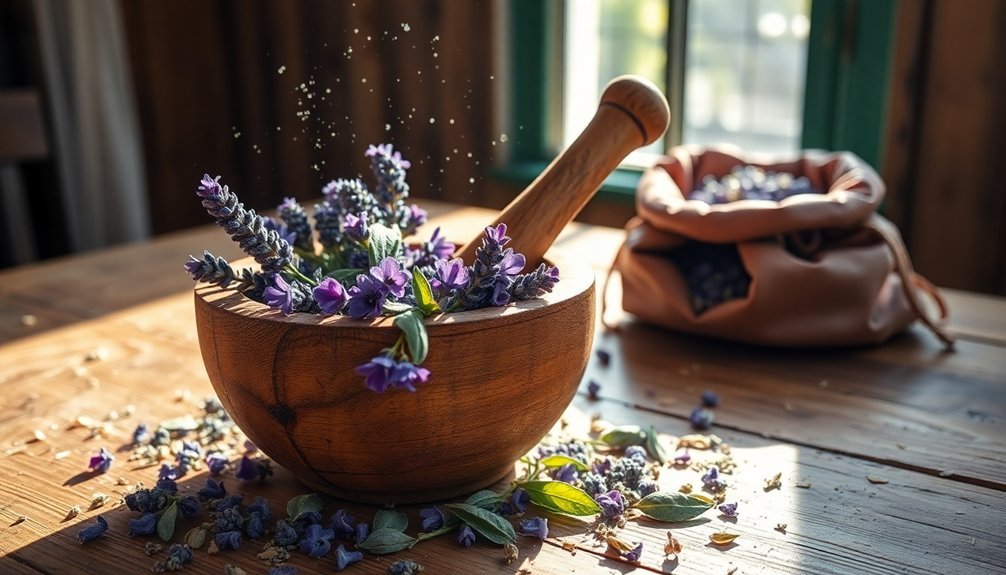
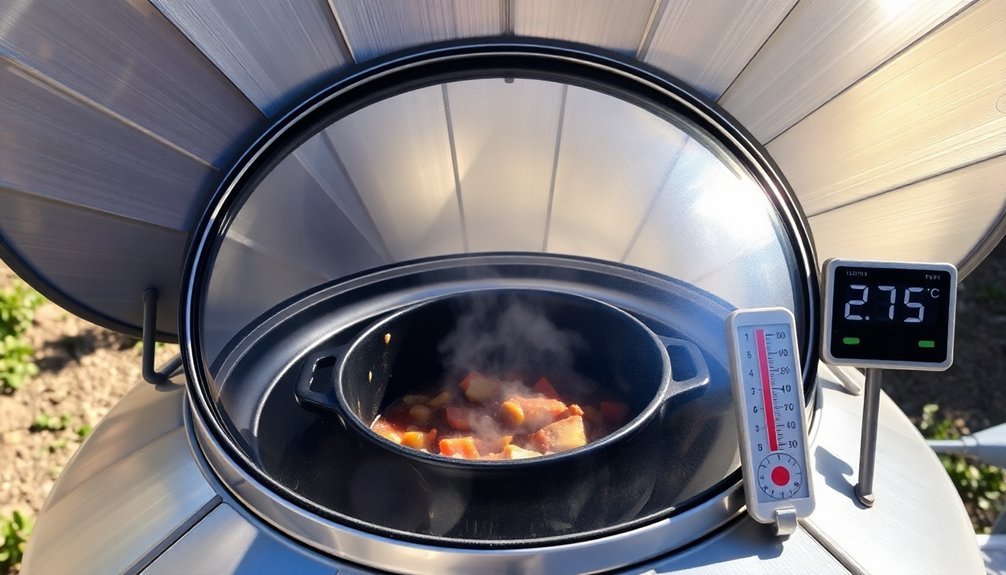
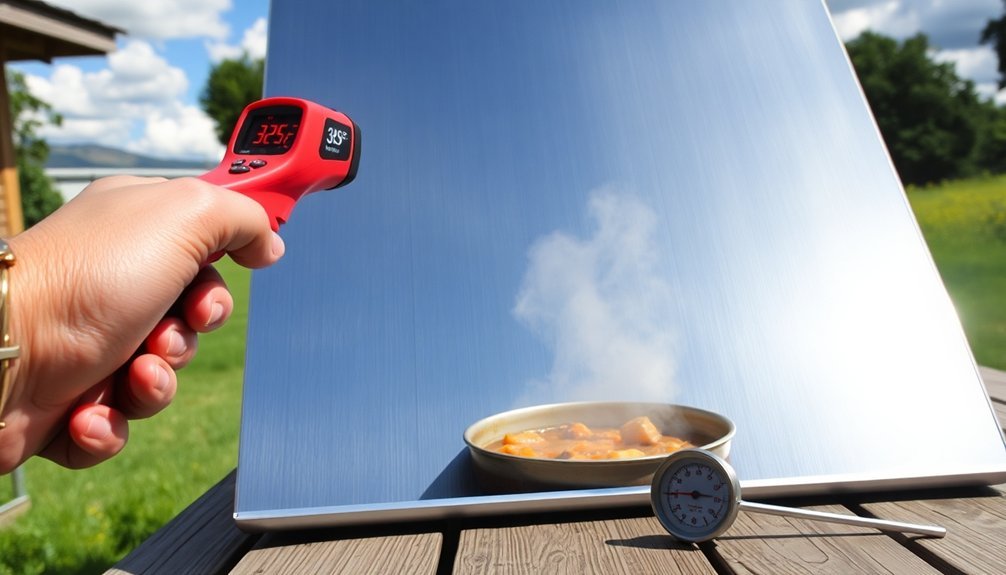

Leave a Reply